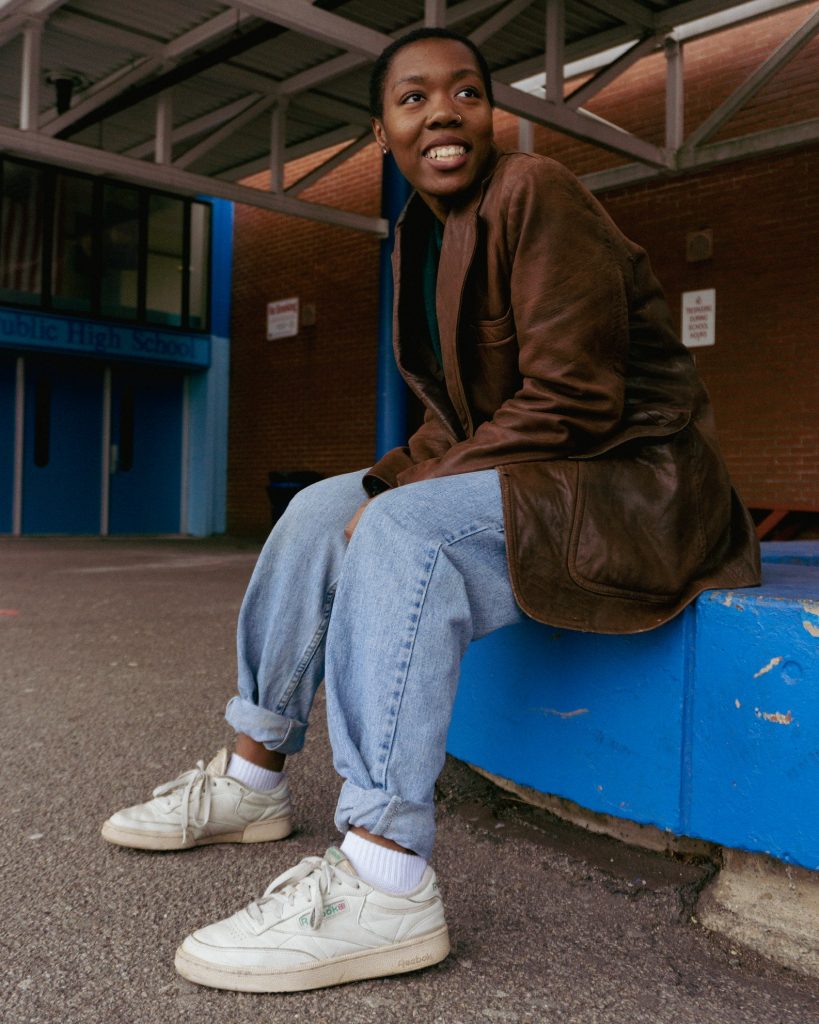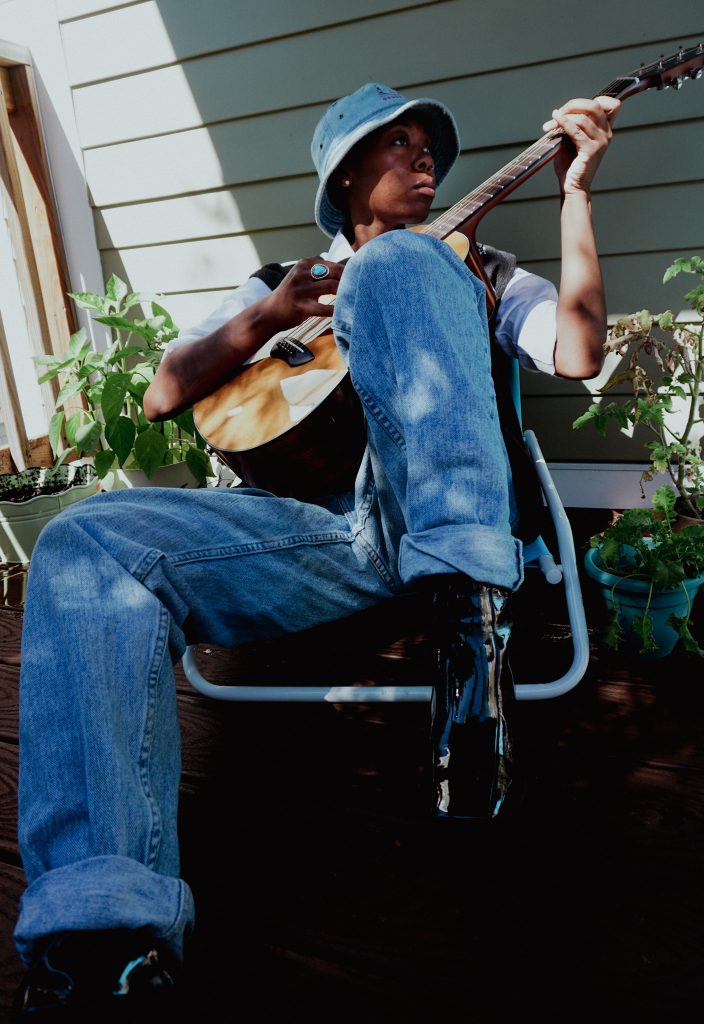Alana Colvin is a multi-instrumentalist, recent music college graduate, and proof that even young musicians can have meaningful and significant breakthroughs in their journeys.

Hi Alana. Why don’t you tell us a little bit about your background?
I was born in Cleveland, Ohio but moved early on to Seattle, which had a great influence on me as a musician. Hendrix, Pearl Jam, Soundgarden, very prominent music that was regularly heard in the city. That’s where I started playing guitar. When I was ten, I moved back to Cleveland, and that’s where I really got grounding as a musician. My grandfather is a musician, so he took me under his wing, and I joined choir and band. Playing an instrument was required at my school and I just started racking up instruments and school performances. When I was in middle school, I joined a band and we did the Warped Tour. Then I went to a performing arts high school, Cleveland School of the Arts, where I played guitar for the orchestra, and flute for the band. In my junior year I studied classical guitar with the Cleveland Classical Guitar Society; I did that for two years before graduating and getting accepted to a prominent music college. I went there for three years and graduated a year early with degrees in songwriting and music business.
You play a bunch of instruments – was there something that drew you to the guitar?
My first instrument was piano, but guitar is an instrument that speaks for me very well. I feel like I’m not a very great talker. I’m kind of awkward. But when I’m playing guitar, I’m able to get ideas across very quickly and thoroughly, and it challenges me, but it also is so easy for me to speak through and get what I’m feeling out in a clear and precise way. I kind of feel like it’s an extension of my hands.
So you graduated a year early – what are you doing now?
I’m writing music for a short film right now. I’m also the composer in residence for the Cleveland Classical Guitar Society. I’m writing a lot of jazz arrangements for the students and trying to introduce more female composers and woman musicians to their repertoire as well, with a few of my own original compositions. Outside of that, I work at a bookstore and I’m taking a year off from school to just have time because I went to school through COVID, which was not super amazing. So I’m taking a year off to play guitar without it being an assignment for the first time in a few years. And I’m applying to The New School for their Performer-Composer Master program.
Tell us a little bit about your college experience.
I was lucky enough to enter college through a program that supports Black students. The purpose of the program is to create a community around the Black students because we make a very, very small amount of the school population. In that first week it was very apparent to me that there were very few women in the guitar department and even fewer black women participating in the program.
I also noticed that my teachers would talk differently to me than they would the male students. They’d ask us to play a C major scale and when the guys played they’d be like, “Great, great.” And to me it was, “Do you think you can handle this? Wow, you’re really getting good at that.” I’m not the world’s greatest guitarist, but I am a very competent guitarist. And what I was playing would be so far beneath my baseline capability for the reactions that I was getting.
There was also an ensemble director who was very condescending to me, to the point where others were noticing. When I asked why he was doing this, he said it was because I looked like I didn’t know what I was doing. And I’m thinking, I’m the only one who brings in charts. I’m learning someone else’s music on top of my own and addressing any notes on the music within the next week or performance in class. And when I was walking out of the classroom, he says, “Wait. Is this a race thing?” And I was like, “What? No, this isn’t a race thing. This isn’t a gender thing. This is me trying to become a better musician.”
On another occasion, an instructor told me that a song I wanted to play was going be too hard for me. So I learned it in two days at tempo and sent him a video of me playing it. That pretty much set the tone for my entire college experience. And by the end of it, there were a lot more people coming out about their experiences. All women, primarily people of color.
It was weird to feel like I was more than capable and nowhere near the target at the same time
Once I was out of that environment, it became very clear to me how much I compressed myself to avoid those interactions. Upon graduating, I found myself just being able to sit with the guitar and play. Like the piece I wrote for the Instagram post (link below), I genuinely would not have thought that it was possible for me to write that around the time I graduated. I could have played it, but I wouldn’t have any faith at all that I would be capable of producing it myself. It was just a series of small events where I would hear somebody play something and just play it, and I would think, “Whoa, maybe there is something there.” Or transcribing something on one listen where I was forced to give myself credit for my ability to play and practice. I found that when there wasn’t a person who was in charge of my grade and my graduation standing over me constantly with their body language and demeanor letting me know that they didn’t think I was as good as someone playing Eruption by Van Halen out of every situation, there was room for what I wanted to play. And that it sounded good, which is really what I needed to hear.
Did you have any teachers who were more encouraging and helpful?
There were two. I found out I had ADHD while in college and the arranging and jazz comp professor also has ADHD; he helped point me in the right direction. He was super understanding, and I always felt like he was able to lift the veil and get a clearer picture of what I’m trying to communicate. And I never felt like I had to prove myself to him.
There was another teacher who was also super kind and relaxed, and a very good and effective teacher. He recognized my ability to play early enough on that it wasn’t an issue. When he was able to see where I was at, he took that as a teaching moment rather than, “Hey, look at her, she can actually do it,” which is what I was getting from other teachers.
Can you go over then where the breakthrough happened and what that looks like now?
The breakthrough happened in a series of small experiences. I think the main one is when we needed a bass player for my ensemble. Since I owned a bass and was taking a bass class, I offered. We were playing a Freddie Hubbard tune. I had one go to get everything down, the changes, the bassline and be able to play on top of that, and I did it in one listen. That was my second to last semester. And the fact that I was able to do that opened something in my head, because in that space I felt as though I didn’t know as much as my professors wanted me to know. And so that told me that something was working and part of it had to be just me.
Then in the spring, I started doing shows with a band with music that I wrote. I was being acknowledged as a guitarist and starting to lose myself in my performance as a guitarist. My partner had come to one of the shows and he said that while we were performing, me playing guitar and acting as the main vocalist, a girl at the show was kind of upset and said, “How am I supposed to make it in the industry when there are people like that performing?” I know what that feels like so I wish I could give her a hug. But that was like, someone thinks that I’m good enough that they feel like this.
Now I’m much clearer on what my voice is as a guitarist and what that sounds like and feels like to me. I’m on a track where I can celebrate that.
The final thing was that once I graduated I wanted to learn chord melody. I always felt like I needed a couple more years before I got there. I couldn’t even comprehend how one does it. So I got a jazz chord melody Hal Leonard book and learned half of it in the wee hours of the morning. After that I wrote my first chord melody arrangement in probably two weeks of Little Sunflower. I changed it up and was really proud of it. And it’s good. That’s something that I thought would take me literally another degree to figure out how to do.
Did those barriers you had around you when you were in college affect your self-esteem?
Totally! There were times where I would be like, Jesus, what were they doing in high school that I wasn’t? I was doing the Warped Tour. I was performing at Severance Hall. You don’t get there by being mediocre. And then I would go into phases where I’d think, I’m better than that dude. I can play that. I can play it in the context of what would make it sound musical, and I can objectively do it better. And of course, that’s not super ladylike to express. Or sometimes it was, I’m not good enough. I don’t know how I’m supposed to be good enough. So I went back and forth a lot. It was weird to feel like I was more than capable and nowhere near the target at the same time. And I felt ultimately like I didn’t fit, like there wasn’t a space for me.
Now I think I’m much clearer on what my voice is as a guitarist and what that sounds like and feels like to me. I’m on a track where I can celebrate that, and I’m not really threatened by other people’s playing styles. I was playing the other day and something from high school came out. And that’s just another part of my voice, which will continue to change and alter. But it’s important to me to be able to stand my ground in it and at least know what that is, because I didn’t know what that was when I started college.

Where do you go from here?
I think just keep growing. For the first time, I really know who I am as an artist, which is super scary because you’re told that you need to know that when you’re graduating, that this is your time to go off and fly. And I think right now it’s finding the perimeter or the glass ceiling and breaking it and starting that journey.
I think the very last thing is that if you’re a woman of color, a non-binary person, a non-binary person of color, there is not enough representation for us in this industry at all. But we’re here.
Visit Alana’s related Instagram post here:
https://www.instagram.com/p/CkoI857LGgM/
Photography: Caroline Rose

